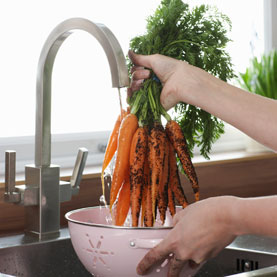 We’ve all been advised to eat more fresh fruit and vegetables, and for good reason – they contain many of the essential vitamins, minerals and trace nutrients we need to be healthy.
We’ve all been advised to eat more fresh fruit and vegetables, and for good reason – they contain many of the essential vitamins, minerals and trace nutrients we need to be healthy.
But that broccoli, spinach, orange or apple you’re planning to eat may not be as healthy as you think…
Over the years, the nutritional content of produce has decreased substantially. Since the 1930s, we have been getting less iron, copper and potassium from the fruits we eat. Today’s vegetables have less calcium, copper and iron. Between 1950 and 1999, the amount of protein, riboflavin and Vitamin C in garden crops has declined.
Quiz: Is Your Body TOXIC? Take the Test...
(get your free personalized report)
Why has produce become less healthy? The answer lies with modern farming methods, which are designed to grow more food, but not healthier food.
The Dilution Effect
Big agricultural corporations make money by growing as much food as they can, on as little land as possible. If a company can triple food production, it can triple its sales.
Unfortunately, soil contains a finite amount of nutrients. If you plant more crops in the same section of soil, there will be fewer nutrients available for each plant. The nutritional value of the food becomes diluted.
These corporations don’t just grow more plants; they grow bigger plants. A consumer will usually pick a larger fruit or vegetable over a smaller one, so agricultural companies intentionally breed produce for size.
Larger doesn’t also mean healthier, however. Increasing the size of a vegetable or fruit doesn’t increase the amount of vitamins or minerals it has. In fact, bigger fruits and vegetables can have lower nutrient levels. Breeding broccoli for thicker heads reduces its calcium and magnesium content.
Quiz: Is Your Body TOXIC? Take the Test...
(personalized report)
Poisons in the soil
Old-fashioned farming relies on crop rotation – planting different types of crops on the same area of land at different times of the year. Different plants take up different nutrients, so crop rotation ensures that the soil won’t lose too much of any one nutrient. Crop rotation can discourage weed growth and can prevent pests and diseases from taking hold.
Crop rotation doesn’t work for big agricultural companies like Monsanto that want to grow lots of produce cheaply and effectively. They have to rely on synthetic fertilizers to grow large quantities of the same crop, and they must use harmful pesticides and dangerous herbicides to prevent damage from insects and weeds.
These chemicals reduce soil quality. Synthetic fertilizers reduce nitrogen levels in soil.
Pesticides kill beneficial as well as harmful insects. By reducing the insect population, they decrease the amount of insects that, when dying, will return nutrients to the soil. Pesticides also block the chemical signals that cause nitrogen-fixing bacteria to return nitrogen to the soil.
Glyphosate, an herbicide developed by Monsanto and marketed under the name Roundup, affects soil microbes and decreases the amount of iron, calcium, magnesium and nickel in soil.
Roundup is deadly to earthworms, which play an essential role in soil ecology.
Of course, these chemicals can harm us in other ways. Once they are absorbed into the soil, they can be taken up by plants and then transferred to our plates. Wind and water can carry particles long distances, so they can affect other organisms that we eat. Roundup is toxic to human cells.
GMOs
By creating genetically modified organisms, big agricultural companies have found another way to grow more food at a lower cost. Companies can create GMOs that are resistant to pests and herbicides.
However, GMOs can affect the soil’s ecosystem. Genes that have been transferred to crops to produce GMOs may be transferred to microorganisms that naturally live in the soil.
What can you do?
- Buy organic – To get the most from your produce, purchase organic fruits and vegetables. According to the USDA, a food can only be labeled organic if it is grown without the use of synthetic chemicals.
- Cut down on processed foods – To decrease your fructose intake, reduce the amount of processed foods – which often contain HFCS – in your diet.
- Consider supplements – Although organic farmers don’t use herbicides or pesticides, they may still grow organic produce in depleted soil. Organic fruits and vegetable may be more nutrient–rich than produce grown with chemicals, but they’re still nutrient-depleted compared to the fruits and vegetables of long ago. To get all the nutrients you need without gorging on apples, bananas, plums, kale and broccoli, you may need to take vitamin or mineral supplements.
- Use your power as a consumer – Huge agricultural corporations grow cheap, tasteless food that’s low in nutrition because it makes them money. Consumers buy their produce because it’s inexpensive and looks good. A big, red, shiny (because it is covered with wax) apple sold with a discount can seem like a bargain. It isn’t. You’re not buying food because you want to look at it. You’re buying produce because you want to be healthy. When you spend money on food that is nutritionally bankrupt, you are throwing money away.
Send Big Agriculture a message by refusing to purchase nutrient-poor products. Let them know that you care about the nutrient content of the food you eat. Let them see that you can’t be fooled.
Additional Sources:
Crop Rotation (Royal Horticultural Society)
Declining fruit and vegetable nutrient composition: what is the evidence? (HortSci)
Environmental Fate of Pesticides (British Columbia Ministry of Agriculture)
